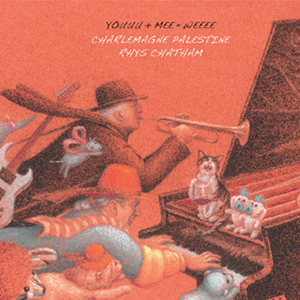166 minutes with Charlemagne Palestine (piano Bösendorfer, orgue Yamaha and voice) and Rhys Chatham (trumpet, loop pedal, electric guitar).
Charlemagne Palestine (born Charles Martin ni 1947 in Brooklyn, New York) wrote intense, ritualistic music in the 1970s, intended by the composer to rub against audiences' expectations of what is beautiful and meaningful in music. A composer-performer, he always performed his own works as soloist. His earliest works were compositions for carillon and electronic drones, and he is best known for his intensely performed piano works. He also performs as a vocalist. Palestine's performance style is ritualistic; he generally surrounds himself (and his piano) with stuffed animals, smokes large numbers of kretek (Indonesian clove cigarettes) and drinks cognac.
See also
Marie Canet: Palestine, first name Charlemagne – Meshugga Land.
Rhys Chatham began his musical career as a piano tuner for avant-garde pioneer
La Monte Young as well as harpsichord tuner for Gustav Leonhardt, Rosalyn Tureck and Glenn Gould.
He soon studied under electronic music pioneer Morton Subotnick and minimalist icon La Monte Young and was a member of Young's group, The Theater of Eternal Music, during the early seventies; Chatham also played with
Tony Conrad in an early version of Conrad's group, The Dream Syndicate. In 1971, while still in his teens, Chatham became the first music director at the experimental art space The Kitchen in lower Manhattan. His early works, such as Two Gongs (1971) owed a significant debt to Young and other minimalists.His concert productions included experimenters
Maryanne Amacher, Robert Ashley, Philip Glass, Meredith Monk,
Pauline Oliveros, Steve Reich, and early alternative rockers such as Fred Frith, Robert Fripp, Arto Lindsay, and John Lurie. He has worked closely with visual artist/musician Robert Longo, particularly in the 1980s, and on an experimental opera called XS: The Opera Opus (1984-6) with the visual artist Joseph Nechvatal.
By 1977, Chatham's music was heavily influenced by punk rock, having seen an early Ramones concert. He was particularly intrigued by and influential upon the group of artists music critics would label No Wave in 1978. Members of the New York City noise rock band Band of Susans began their careers in Chatham's ensembles; they later performed a cover of Chatham's "Guitar Trio" on their 1991 album, The Word And The Flesh. (This parallels the way that members of fellow NYC noise rockers Sonic Youth began their careers in Branca's ensembles; Thurston Moore of
Sonic Youth did play with Chatham as well.)
Chatham began playing trumpet in 1983, and his more recent works explore improvisatory trumpet solos; these are performed by Chatham himself, employing much of the same amplification and effects that he acquired with the guitar, over synthesized dance rhythms by the composer Martin Wheeler.

